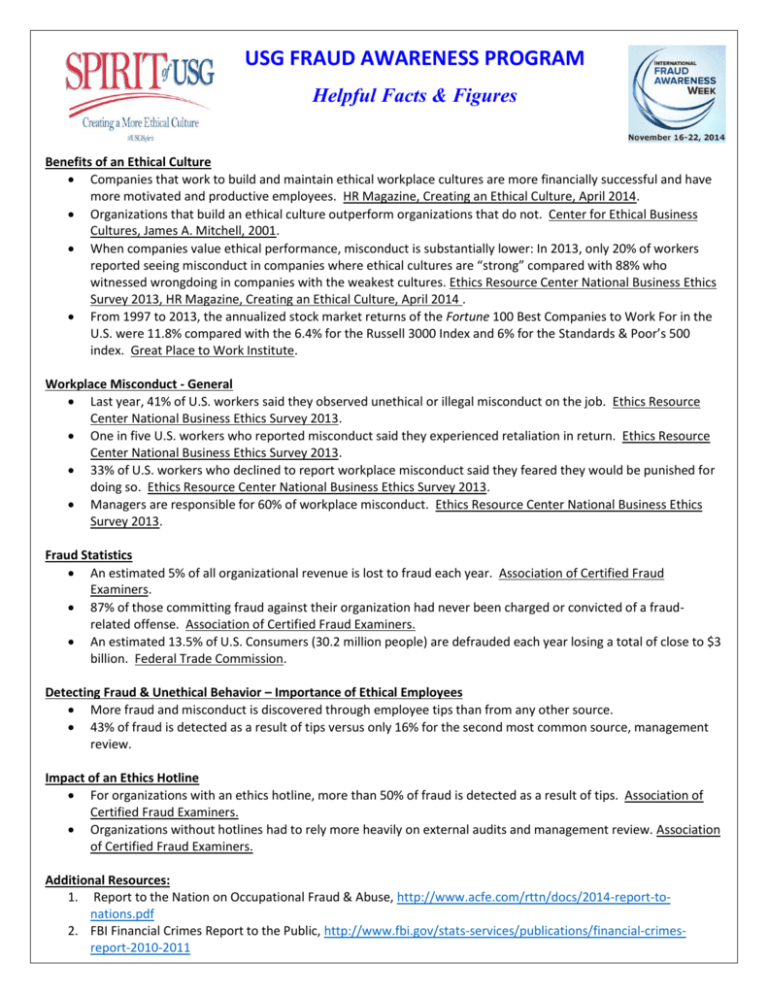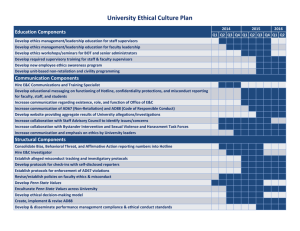Fraud & Ethics Facts
advertisement

USG FRAUD AWARENESS PROGRAM Helpful Facts & Figures Benefits of an Ethical Culture Companies that work to build and maintain ethical workplace cultures are more financially successful and have more motivated and productive employees. HR Magazine, Creating an Ethical Culture, April 2014. Organizations that build an ethical culture outperform organizations that do not. Center for Ethical Business Cultures, James A. Mitchell, 2001. When companies value ethical performance, misconduct is substantially lower: In 2013, only 20% of workers reported seeing misconduct in companies where ethical cultures are “strong” compared with 88% who witnessed wrongdoing in companies with the weakest cultures. Ethics Resource Center National Business Ethics Survey 2013, HR Magazine, Creating an Ethical Culture, April 2014 . From 1997 to 2013, the annualized stock market returns of the Fortune 100 Best Companies to Work For in the U.S. were 11.8% compared with the 6.4% for the Russell 3000 Index and 6% for the Standards & Poor’s 500 index. Great Place to Work Institute. Workplace Misconduct - General Last year, 41% of U.S. workers said they observed unethical or illegal misconduct on the job. Ethics Resource Center National Business Ethics Survey 2013. One in five U.S. workers who reported misconduct said they experienced retaliation in return. Ethics Resource Center National Business Ethics Survey 2013. 33% of U.S. workers who declined to report workplace misconduct said they feared they would be punished for doing so. Ethics Resource Center National Business Ethics Survey 2013. Managers are responsible for 60% of workplace misconduct. Ethics Resource Center National Business Ethics Survey 2013. Fraud Statistics An estimated 5% of all organizational revenue is lost to fraud each year. Association of Certified Fraud Examiners. 87% of those committing fraud against their organization had never been charged or convicted of a fraudrelated offense. Association of Certified Fraud Examiners. An estimated 13.5% of U.S. Consumers (30.2 million people) are defrauded each year losing a total of close to $3 billion. Federal Trade Commission. Detecting Fraud & Unethical Behavior – Importance of Ethical Employees More fraud and misconduct is discovered through employee tips than from any other source. 43% of fraud is detected as a result of tips versus only 16% for the second most common source, management review. Impact of an Ethics Hotline For organizations with an ethics hotline, more than 50% of fraud is detected as a result of tips. Association of Certified Fraud Examiners. Organizations without hotlines had to rely more heavily on external audits and management review. Association of Certified Fraud Examiners. Additional Resources: 1. Report to the Nation on Occupational Fraud & Abuse, http://www.acfe.com/rttn/docs/2014-report-tonations.pdf 2. FBI Financial Crimes Report to the Public, http://www.fbi.gov/stats-services/publications/financial-crimesreport-2010-2011







